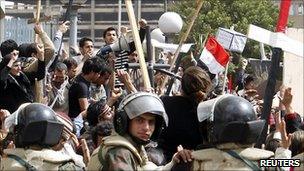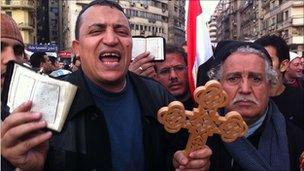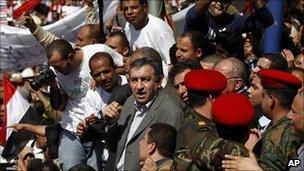New sectarian clashes raise fears of chaos in Egypt
- Published

Egyptian Christians protested on successive days outside the state television building in Cairo.
Violent scenes in Cairo this week have renewed concerns about sectarian tensions after encouraging signs of national unity during the recent revolution.
They were also a worrying sign of the extent to which security has broken down.
Reports say 13 people were killed and dozens injured when a Muslim mob attacked a crowd of thousands of Christians protesting about the destruction of a church.
In recent years, relations have deteriorated between Egypt's Sunni Muslim majority and Coptic Christians, who account for about 10% of the population.
However during the 18 days of anti-government protests in Tahrir Square, preachers from both faiths addressed the crowds and prayers for Muslims and Christians were respected.
"We are one hand, we are one unit," a demonstrator, Ali, told me. "Muslims and Christians are brothers."
As he held up a copy of the Koran, he embraced a Copt, Attiya, who was carrying a cross. Attiya said all Egyptians wanted the same things - social justice and democracy.
Such displays were particularly affecting after the year began with a devastating bombing at a church in Alexandria, which killed more than 20 people. It was the worst sectarian attack in a decade.
Familiar pattern
Now there are worries about a return to distrust and intolerance. The latest clashes had a familiar pattern.

The surge of popular unity during anti-government protests raised hopes for lasting harmony between Christians and Muslims.
It was a relationship between a Coptic man and a Muslim woman that set off the fighting in the village of Sol, in Helwan, to the south of Cairo. Inter-faith relationships are a taboo for many in conservative sections of Egyptian society.
After Muslims burnt down the local church, the army offered to rebuild it. However, Christians were angered by reports that the governor demanded their place of worship be relocated outside the village.
Divisive decisions by officials and restrictions on church construction and repairs, which do not apply to mosques, are long-standing complaints of the Coptic community in Egypt.
Hundreds joined protests outside the state television studio in central Cairo demanding the Helwan governor be sacked and calling for greater protection.
On Tuesday there was also a large demonstration in the poor Cairo suburb of Moqattam, where Christians blocked off a main road, burnt tyres and threw stones. A Muslim mob set upon them and guns were fired during several hours of pitched battles.
The killings added to a sense of lawlessness and insecurity. The police have yet to return fully to Egypt's streets, after they scattered three days into the popular uprising that ousted the president.
While the military is now in control, it does not have sufficient troops to take over full policing duties.
Religious reforms?
As reforms are drawn up during Egypt's transitional period, ahead of new presidential and parliamentary elections, some Christians have been calling for their concerns about discrimination to be addressed.
In particular they want an article of the constitution removed that says: "Islam is the religion of the state" and determines that "the principal source of legislation is Islamic jurisprudence".
Yet others argue that the debate should wait, such is the sensitivity of the current situation.
"Article two of the constitution creates a deep concern among Christians and some moderate Muslims also," says Youssef Sidhoum, editor of the Coptic Sunday newspaper, al-Watani.
"Ultimately we look forward to omitting that but now is not the right time to campaign for it. I wouldn't afford to lose whatever national solidarity is there while we are working to create a civil state."
The Egyptian Initiative for Personal Rights (EIPR), which monitors sectarian tensions, says legal changes are required to ensure equality before the law.
"What is needed now is to focus so that any new constitution establishes a red line which will not allow discrimination on any grounds," says its director, Hossam Bahgat. "We must also preserve a clause making the state responsible for ensuring freedom of religion and belief."
New unity calls
The Supreme Council of Armed Forces has been meeting members of the cabinet to discuss ways to deal with the clashes between Christians and Muslims.

The new prime minister is promising to put police back on the streets and calls for national unity
In a statement, the new prime minister, Essam Sharaf, said the security service would return "in full force to carry out its national duties."
He also stressed the importance of national unity in the face of what he said were attempts to create chaos and confusion.
There have been gestures of solidarity, with the head of the main Islamic institution, al-Azhar, promising that Muslims would help with the reconstruction of the church in Helwan.
Political parties have condemned the latest violence, along with the Muslim Brotherhood, a leading opposition force. It accused remaining supporters of the ousted president of being behind sectarian incitement.
There are ambitious plans for a march from Tahrir Square to Sol on Friday under the slogan "No to sectarian tension".
With widespread dismay that Egypt's post-revolutionary euphoria is rapidly giving way to enduring problems, organisers hope for a high turnout.
- Published5 January 2011
- Published7 January 2011